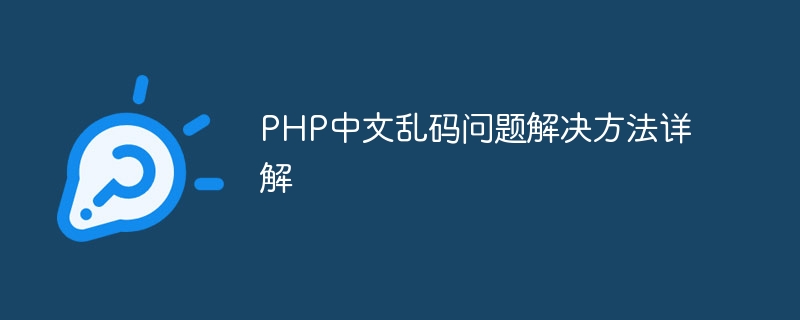Home >Backend Development >PHP Tutorial >Detailed explanation of how to solve the problem of Chinese garbled characters in PHP
Detailed explanation of how to solve the problem of Chinese garbled characters in PHP
- 王林Original
- 2024-03-23 17:15:03505browse

Detailed explanation of the solution to the problem of Chinese garbled characters in PHP
In the process of PHP development, we often encounter the problem of Chinese garbled characters. This problem affects the user experience and also Reduce the readability of the website. The root cause of the Chinese garbled problem is inconsistent encoding, which causes the server to be unable to correctly parse Chinese characters. This article will introduce in detail the solution to the Chinese garbled problem in PHP and provide specific code examples to help developers better deal with this common problem.
1. Database connection settings
When connecting to the database, we need to ensure that the encoding of the database and the PHP file are consistent so that Chinese characters can be stored and read correctly. Generally, we need to set the encoding format of the database to utf8 before connecting to the database. The sample code is as follows:
<?php
$servername = "localhost";
$username = "root";
$password = "";
$dbname = "myDB";
$conn = new mysqli($servername, $username, $password, $dbname);
$conn->set_charset('utf8');
if ($conn->connect_error) {
die("Connection failed: " . $conn->connect_error);
}
?>By setting the encoding format of the database connection to utf8, we can ensure that the database correctly stores and reads Chinese characters. , to avoid the occurrence of Chinese garbled characters.
2. PHP page encoding setting
Setting the correct encoding format in the header of the PHP page is also a key step to solve the problem of Chinese garbled characters. We usually need to add the following code at the beginning of the PHP page:
<?php
header('Content-Type: text/html; charset=utf-8');
?>By setting the encoding format of the page to utf-8, we can ensure that the page displays Chinese characters correctly and avoid the problem of Chinese garbled characters.
3. Data transmission encoding settings
When transmitting data, we need to ensure that the encoding format of the data is consistent, especially when it comes to page submission and data return. Generally, we need to use the mb_internal_encoding() function to set PHP's internal encoding format to utf-8. The sample code is as follows:
<?php
mb_internal_encoding("utf-8");
?>By setting PHP's internal encoding format to utf-8, we can ensure that the data is transmitted There will be no garbled characters during the process, ensuring the integrity and accuracy of the data.
4. File encoding settings
When editing PHP files, we need to ensure that the encoding format of the file is utf-8, so that Chinese characters can be processed correctly. In the editor, you can usually choose the encoding format when saving the file. It is recommended to choose the utf-8 encoding format to avoid the occurrence of Chinese garbled characters.
Summary
Through the settings of the above methods, we can effectively solve the problem of Chinese garbled characters in PHP, ensure that Chinese characters are processed correctly during website development, and improve user experience and website readability. . In actual development, developers need to follow the above setup steps and make adjustments according to specific circumstances to ensure coding consistency and accuracy across the entire website. I hope the content of this article will be helpful to everyone. For more content, please pay attention to Muke.com.
The above is the detailed content of Detailed explanation of how to solve the problem of Chinese garbled characters in PHP. For more information, please follow other related articles on the PHP Chinese website!

